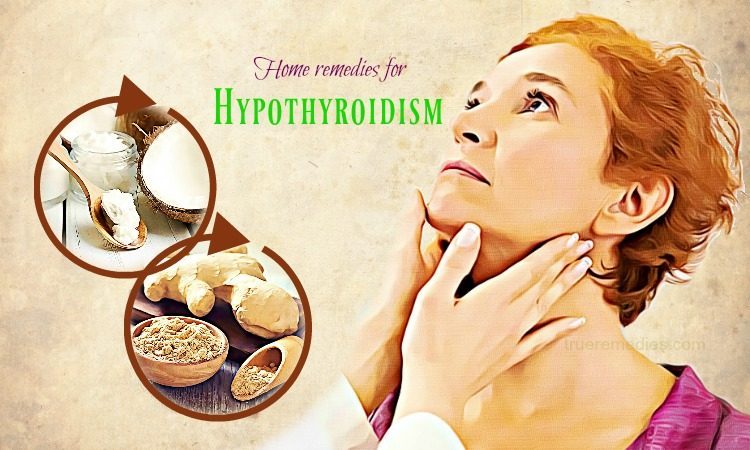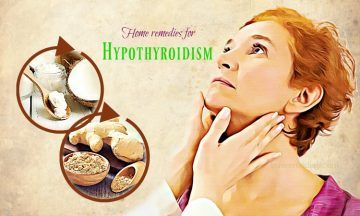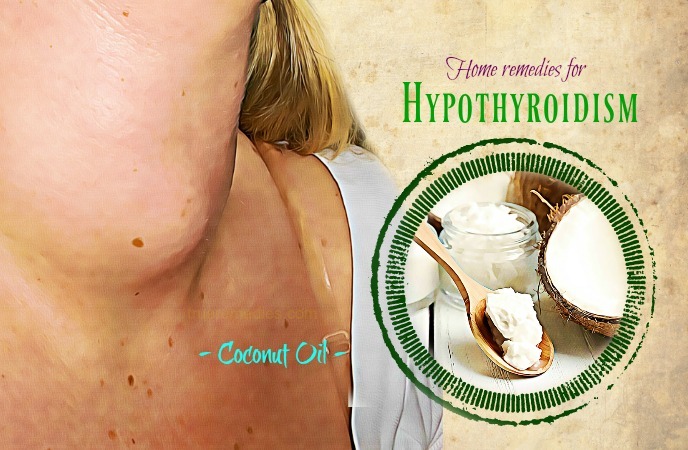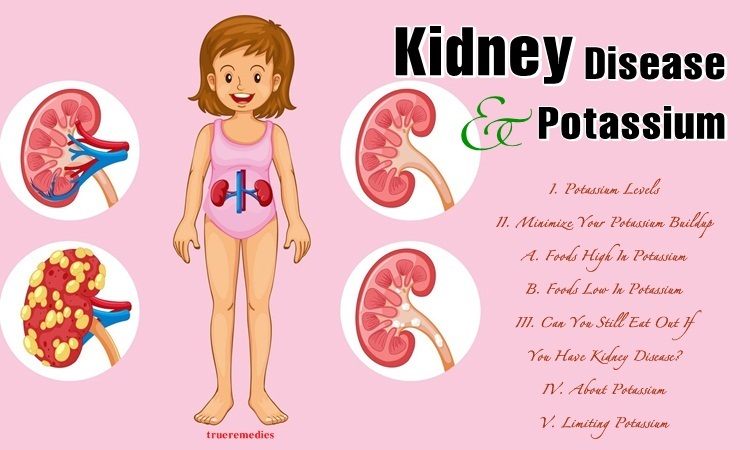Updated: 11/21/2019
CONTENTS
Hypothyroidism is a widespread disease, affecting about 4.6% of the US population[1]. Hypothyroidism is a syndrome characterized by impaired thyroid function and inadequate thyroid hormone production, causing damage to tissues and organs, and metabolic disorders. This disease is common in women. Hypothyroidism causes a lot of discomfort and seriously affects the quality of life. However, if treated properly, we can keep this condition under control. Today’s article will reveal to you the top 13 Natural Home Remedies For Hypothyroidism to help you live healthier and happier. However, let’s have a look at some fundamental information related to this health issue first.
What Is Hypothyroidism?
To understand what hypothyroidism is, it is necessary to have some basic knowledge about the thyroid gland. The thyroid gland is an endocrine gland in the neck, acting as a regulator of metabolism. An inactive thyroid may affect all aspects of health, especially weight, depression, and energy levels.
The thyroid gland also helps regulate body temperature to match the heat of the environment, thus keeping the brain clear and heart beats regularly. When the thyroid gland is underactive or low, it is impaired, because it does not produce enough thyroid hormone, which in turn causes hypothyroidism[2]. In contrast, when the thyroid gland secretes too much hormone, it leads to the overactive thyroid gland, resulting in hyperthyroidism[3]. Both hypothyroidism and hyperthyroidism, if left untreated, may affect thyroid function, and even lead to thyroid cancer.
Hypothyroidism is a type of thyroid dysfunction. The thyroid gland secretes thyroid hormones (thyroid-stimulating hormone (TSH), thyroxine (T4), and triiodothyronine (T3)) that regulate metabolism in the body[4]. Some of the thyroid functions include controlling calcium levels in the blood, boosting metabolism, stimulating the action of the heart and nervous system, and regulating the body heat.
If you have hypothyroidism, your thyroid gland does not produce enough hormones for your body needs. This condition may be manifested in various forms depending on the patient’s age and the level of hypothyroidism. This disease is common in women, accounting for 2%, while in men, the percentage is only 0.1%. Congenital hypothyroidism occurs in 1/4,000 neonates[5]. When the condition is mild, it is easily missed, so patients of hypothyroidism usually recognize it when clinical symptoms are apparent.
TrueRemedies Partner Solutions

Need a Help from the Leading Expert Online, Available 24/7?
They’re all here and ready to answer your questions online or by phone. Keep asking questions until you get the answer you need.
Hypothyroidism has severe effects on people’s health, including:
- Affects the development of the body
This mainly happens to children. In children with hypothyroidism, their developmental capacity is reduced. If not detected and treated early, children will not get the standard height[6] (they will be dwarfed).
- Affects the brain
Thyroid hormone also promotes the development of the baby’s brain during fetal life and the first few years after birth. If thyroid hormone levels are not adequately excreted during fetal development, the growth and maturation of the brain will slow down[7], and the brain will be smaller than average.
If not treated with thyroid hormone for several days to several weeks after birth, the child’s intelligence will be threatened.
- Affects cell metabolism
Hypothyroidism affects the metabolism of most tissues in the body.
- Affects the metabolism of glucid, lipid[8], and protein
- Affects the cardiovascular system[9] [10], skin, and muscle
What Are Common Causes Of Hypothyroidism?
Here are some common causes of hypothyroidism:
- The body secretes antibodies that attack the thyroid gland[11]. This is a manifestation of the disorder of the body.
- Pregnancy[12]
- Side effects of treating hyperthyroidism
- Side effects of some drugs like lithium and amiodarone
- Thyroid surgery
- In the course of treatment with radiation therapy
- Hormone imbalances
- Poor diet, especially one lacking in selenium and iodine[13].
- Genetics[14]
- High level of emotional stress[15] [16].
What Are Common Symptoms Of Hypothyroidism?
Mild hypothyroidism has unclear symptoms. As the disease is so prevalent in the elderly, people often think that its symptoms are due to old age. The following are some of the most common symptoms of hypothyroidism[17]:
- Feeling bad eating
- Constipation
- Pale or dry skin
- Cold easily
- Tiredness and dizziness
- Poor memory
- Depression
- Slow hair growth
- Hoarse voice
- Shortness of breath and low heart rate
- Weight gain
- Muscle or joint pain
- Water retention
- Menstrual problems
- Less sexual interest
- In severe hypothyroidism, the tongue may swell (tongue enlargement); face, arms, legs are swollen; the skin may be dark. You may experience other symptoms and signs not mentioned. If you have any questions about the signs of the disease, consult your doctor.
Who Is At Risk Of This Problem?
Women, especially the elderly, are more likely to suffer from hypothyroidism. Also, patients who have had thyroid surgery or are undergoing radiotherapy are at high risk of hypothyroidism.
When To See A Doctor?
See your doctor if you are feeling fatigued for no apparent reason or you have any signs and symptoms of hypothyroidism, such as dry and pale skin, puffy face, or constipation. You will also need to see a doctor to periodically check your thyroid function if you have had thyroid surgery before.
Talk to your doctor about hypothyroidism if your cholesterol level is higher than usual. In case you are being treated for thyroid hormone, it is essential to ensure that you are getting the correct dose. Over time, the dosage may be changed to match the condition of the body.
There, you have discovered some information about hypothyroidism; it is time to find out the best methods to treat its symptoms. Let’s have a look!
13 Natural Home Remedies For Hypothyroidism Treatment
1. Coconut Oil
Researchers have recently announced that various nutritious of coconut oil help treat hypothyroidism. The nutritional value of coconut oil is comparable to breast milk. Coconut oil contains lauric acid[18] – a medium chain fatty acids, and it has natural anti-inflammatory properties[19]. Besides, this oil has healthy acids coming with antifungal and antibacterial properties that help improve the immune system of humans. People with hypothyroidism gain weight unnaturally due to hormonal imbalance and decreased metabolic rate. Research shows that healthy acids found in coconut oil help lose weight[20]. Regular consumption of coconut oil supports weight loss in patients with hypothyroidism.
Patients of hypothyroidism also suffer from a decrease in metabolic rate. This will lead to various problems such as weak cells and bones, decreased immunity, and fatigue. Experts said that the medium chain fatty acids found in coconut oil stimulate cells which are responsible for promoting a healthy metabolism[21]. Besides, coconut oil may increase basal body temperature. That is very important for hypothyroid patients, especially when they are sensitive to cold.
Arthralgia and headache are common symptoms of hypothyroidism due to inflammation of body tissues, or as a result of the decrease in thyroid hormone production. Coconut oil has natural properties that reduce inflammation[22] and pain. Using warm coconut oil for body massage is recommended for people suffering from hypothyroidism. If your joints or muscles are aching, massaging with warm coconut oil may significantly reduce pain. You can do this a few times a day.
This oil helps to improve the condition of body cells and tissues, so it may be a part of the patient’s diet. When cooking, add coconut oil to the dishes. Or, add a little bit of coconut oil to fresh milk, salad, or smoothie. This not only helps relieve the uncomfortable symptoms of hypothyroidism but also makes the food taste more appealing. By adding coconut oil to your daily meals, the metabolism is improved, and the immunity is also enhanced.
2. Apple Cider Vinegar
Using apple cider vinegar is a smart choice to alleviate hypothyroidism symptoms. Apple cider vinegar may help purify the body and restore alkaline balance as well as stabilize hormone levels. Raw apple cider vinegar is very acidic, so it promotes energy loss in the body. However, drinking pure apple vinegar is not suitable for your stomach, you should combine it with nutritious and natural foods. This gives you plenty of nutrients and energy to maintain your health after weight loss.
Researchers have found that adding apple cider vinegar to your diet helps your body to feel full faster and longer[23]. This is mainly because there is a rich source of pectin found in apples[24]. This pectin also works with acid to help your body digest food easily and quickly. This also increases your metabolism, helping to burn more calories. It is also reported that vinegar helps to reduce blood sugar and insulin levels[25]. This allows you to lose weight steadily over time.
To apply this remedy, please follow these steps:
- Prepare a glass of warm water about 30 degrees Celsius, 2 teaspoons of honey, and 2 teaspoons of apple cider vinegar
- Mix them well
- Drink this cup of water 3 hours after meals
When combined with honey, the harmful effects of apple cider vinegar to your stomach will be eliminated. This remedy is extremely safe because honey helps nourish stomach tissues. Having a glass of this mixture after each meal will help you to improve the uncontrolled weight gain symptoms of hypothyroidism. Besides, after a few days, you will notice a positive change in your metabolism.
3. Seaweed
This is another must-try home treatment for hypothyroidism. The human thyroid gland needs iodine to produce the necessary hormones and maintain its functions[26]. However, not all people add enough iodine to their diet, especially those in the highlands as foods they use daily contain too little iodine. To add iodine, many people choose to eat seaweed, because seaweed contains a lot of iodine[27] [28] and minerals that are beneficial to human health, especially for the thyroid.
Seaweed is helpful for people suffering from hypothyroidism due to iodine deficiency syndrome. Sea algae also have a strong antioxidant effect[29] and may enhance the immune system naturally. Therefore, thyroid patients, especially patients with autoimmune thyroid disease, should use seaweed persistently to have a healthy thyroid gland. Besides algae also help reduce blood fat, it may be anti-inflammatory and the antidote to the thyroid. To treat hypothyroidism, you can use algae as a daily food or take algae supplements.
Seaweed contains nori, wakame, and dulse, which may be used in sushi, soup, and salad. In addition to containing iodine, seaweed provides a variety of nutrients[30] such as fiber, calcium and vitamins A, B, C, E, and K. They help to improve the health of patients with hypothyroidism. However, experts warn that seaweeds may have too much iodine and it may aggravate thyroid problems. Therefore, do not consume too much seaweed. According to the study, for every 100g of seaweed, there are 1-1.8mg of iodine. To ensure health, every day, you should eat no more than 100g seaweed and split it into several meals.
4. Fish Oil
This remedy is one of little – known home remedies for hypothyroidism. Fish oil is considered one of the best foods to increase the production of thyroid hormones and maintain thyroid functions. Fish oil is rich in Omega-3 fatty acids[31] that are good for the body, helping to prevent inflammation and enhance the body’s immune system. Fish oil is known to help you lose weight[32]. Therefore, for uncontrolled weight gain due to hypothyroidism, using fish oil is a great idea. Furthermore, fish oil does not cause side effects like what some weight loss drugs do.
The weak immune system is also a common symptom in patients with hypothyroidism. Regular consumption of fish oil may help you overcome this issue. Thanks to the rich content of Omega-3 fatty acids, fish oil is effective in reducing inflammation as well as reducing pain in the muscles and joints. This helps patients of hypothyroidism feel better. Fish oil is a form of vitamin, and it dissolves in oil. It is best absorbed only with a suitable solvent. Therefore, you should drink fish oil after meals. The amount of fat in the body is an excellent solvent to stimulate the body to absorb nutrients from fish oil. However, consult your doctor before using fish oil because it may affect blood clots.
5. Green Leafy Vegetables
Not only the sick but also healthy people, eating green leafy vegetables is very necessary. Dark green leafy vegetables are a good source of vitamin A and K[33], which are needed to enhance thyroid function, so add these vegetables to your diet. Spinach, lettuce, and other green leafy vegetables are excellent sources of magnesium and minerals[34], which play an essential role in maintaining the metabolism of the body. Expressions such as fatigue, muscle aches, or changes in your heart rate may be a sign that you are not getting enough magnesium in your diet. Eating green leafy vegetables regularly may help you to get rid of these problems.
People with thyroid disease needs special attention when eating cabbage, radishes, broccoli, and white cabbage. They should avoid radishes and broccoli because these foods contain isothiocyanates[35] [36] that limit the body’s iodine intake. When processing these vegetables, it is best to boil over to decompose isothiocyanates.
6. Ginger
Ginger is a natural anti-inflammatory agent[37]. It is rich in magnesium, potassium, and zinc, helping to improve thyroid function[38]. Ginger boosts blood circulation, stimulates gastric secretion, encourages intestinal-gastric excitability, promotes digestion, and helps the body fight against harmful bacteria.
One of the primary uses of ginger is to improve the digestive system, and it also burns fat in the body and boosts the weight-loss process[39]. Ginger juice will bring a sense of fullness and prevent appetite. Therefore, it is a perfect weight loss method for people who are overweight due to hypothyroidism.
You can add ginger to the cooking process, make ginger soup or drink ginger tea with honey to normalize the thyroid function. A cup of ginger tea will make you feel warm if you experience sudden cold symptoms caused by hypothyroidism.
When hypothyroidism causes you to have muscle and joint pain, you can dip a towel into the mixture of hot ginger, salt, and vinegar and apply it to the affected area. However, ginger is only good for your health when you use it in the morning or afternoon. If you drink or eat ginger at dinner or after that, it will make you difficult to sleep.
7. Cocoa
This sounds strange when it comes to home remedies for hypothyroidism, but it works. What should people with hypothyroidism eat? Should they choose cocoa? This is the question of many people. In the opinion of nutrition experts, cocoa is excellent food to improve and enhance thyroid function.
Cocoa is probably the favorite food of many people. It is known as a “nutrient store.” It contains iron, copper, magnesium, zinc, fiber, and vitamin C[40]. Besides, cocoa is rich in saturated fat which does not contain cholesterol, so the fat in cocoa is unlike the one in animals. Cocoa is, therefore, very good for the body.
Not to mention thyroid support, cocoa also improves brain function and supports the nervous system. You should choose pure cocoa powder or cocoa powder without sugar for the best effects.
8. Nuts
Nuts are sources of energy that is rich in selenium and magnesium[41], which help the thyroid gland function better[42].
Nuts such as almonds, cashews, and pumpkin seeds contain lots of magnesium, zinc, copper, vitamins B and E, which are “friendly” nutrients to the human thyroid gland.
Just a small amount of nut is enough for the daily needs. Note that these nuts also have very high-fat content, so using a sufficient amount is essential. Almonds are the most commonly chosen nuts for the boosting thyroid health.
More importantly, almonds do not make significant change in blood sugar and weight. Therefore, the patient can be completely assured. You can soak almonds in water to increase its sweetness and enjoy ¼ cup a day for the best health benefits.
9. Cereals
Constipation is a common symptom of hypothyroidism. Whole grains, bread, pasta, rice, and fiber-fortified foods may support the bowel function[43]. Gluten-free diets reduce weight gain[44] due to hypothyroidism. Therefore, patients should limit the amount of gluten-rich foods. Instead, use grains.
However, the fiber in cereals may affect the synthesis of hormones in the thyroid gland. Patients should avoid whole foods rich in fiber. However, if you want to eat them, make sure you take thyroid supplements before eating for a few hours. Maintaining a healthy weight is difficult for people with hypothyroidism. Nevertheless, no secret of weight loss is more effective than a healthy diet and a regular exercise plan.
10. Berries
Group of berries are thought to be good for the thyroid gland. Choose tomatoes, strawberries, grapes, bananas, raspberries. These berries are not only delicious but also provide you with significant amounts of energy, helping you to avoid fatigue.
They are all very rich in vitamins, enzymes, and antioxidants[45], which may eliminate and destroy all substances that interfere with the activity of the thyroid gland. Also, these fruits contain little sugar but provide significant energy to support thyroid function recovery. The nutrients in the berries contribute to strengthening the immune system[46]. Patients with hypothyroidism should regularly eat berries or drink berries juice.
11. Fish
Fish is a rich source of good fat and lean protein. It is also abundant in vitamin D, amino acids, and magnesium that are essential for your thyroid. Furthermore, fish is rich in iodine, zinc, omega -3, and selenium[47].
Hypothyroidism, if not detected and treated, may increase the risk of heart disease. This is an inevitable result of low-density lipoprotein (LDL) or bad cholesterol. Omega-3 is known to help reduce inflammation, boost the immune system and reduce the risk of heart disease[48]. You should eat about 120 grams of fish/time and three times a week.
12. Practicing In The Sun
Exercising in the sun will supply your body with vitamin D. As a result, metabolic activities[49] and immune functions[50] are promoted. This is precisely what a hypothyroid patient needs. This is reckoned as one of the best home remedies for hypothyroidism.
13. Relaxing Treatments
You can use relaxing methods, including yoga, meditation, relaxation therapy, or ujjayi pranayama – a unique breathing technique to reduce stress and restore the thyroid gland.
Hypothyroidism may lead to increased cortisol levels in the body, which may lead to severe stress[51]. At the moment, practicing meditation, yoga, and relaxing therapies will help reduce anxiety, nervous tension[52] [53], and slow down the progression of the disease.
The above mentioned home remedies for hypothyroidism are claimed to be able to reduce the symptoms of this disease. Choose some of them and alternate them in your treatment to see how effective they are. If you have any contributing ideas to our article, do not hesitate to drop your words below this post. We will answer as soon as possible.











